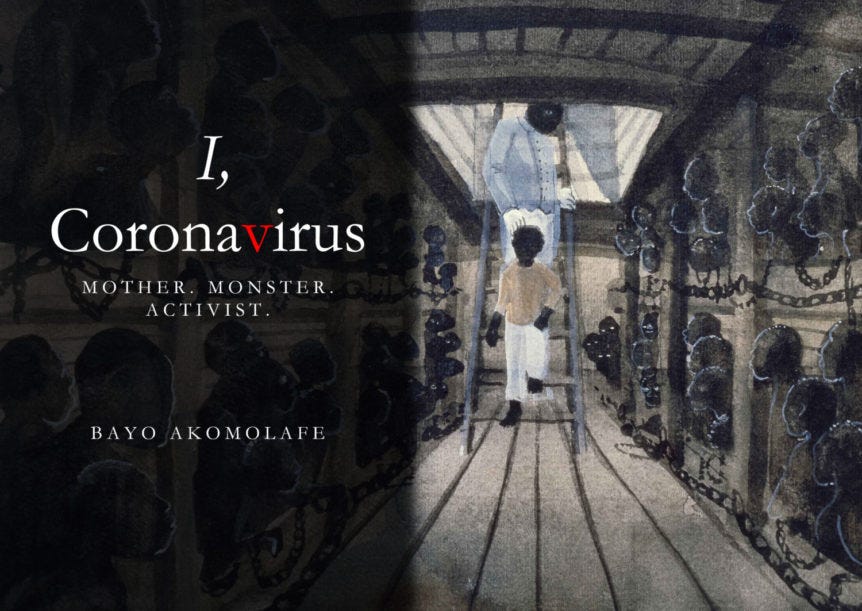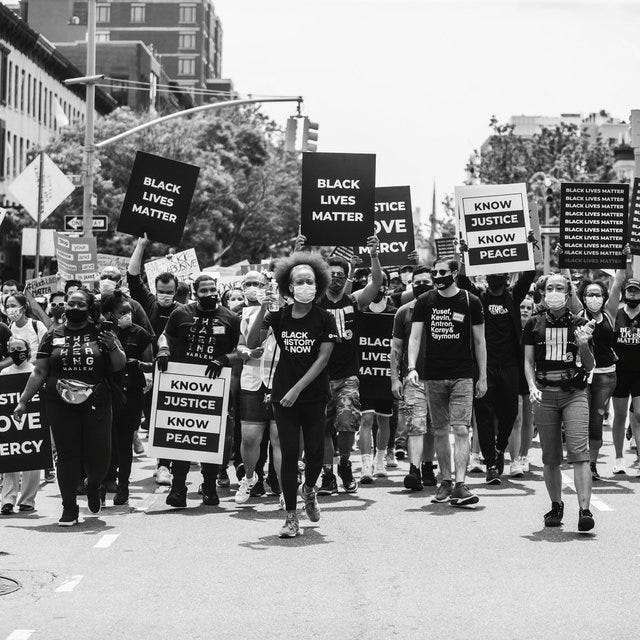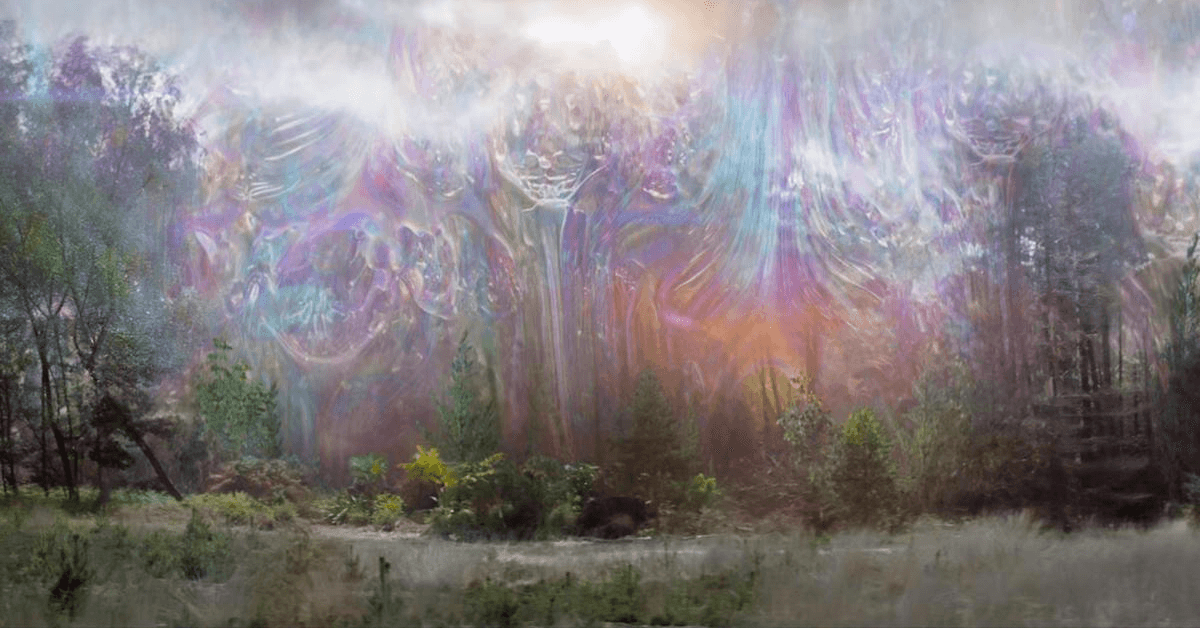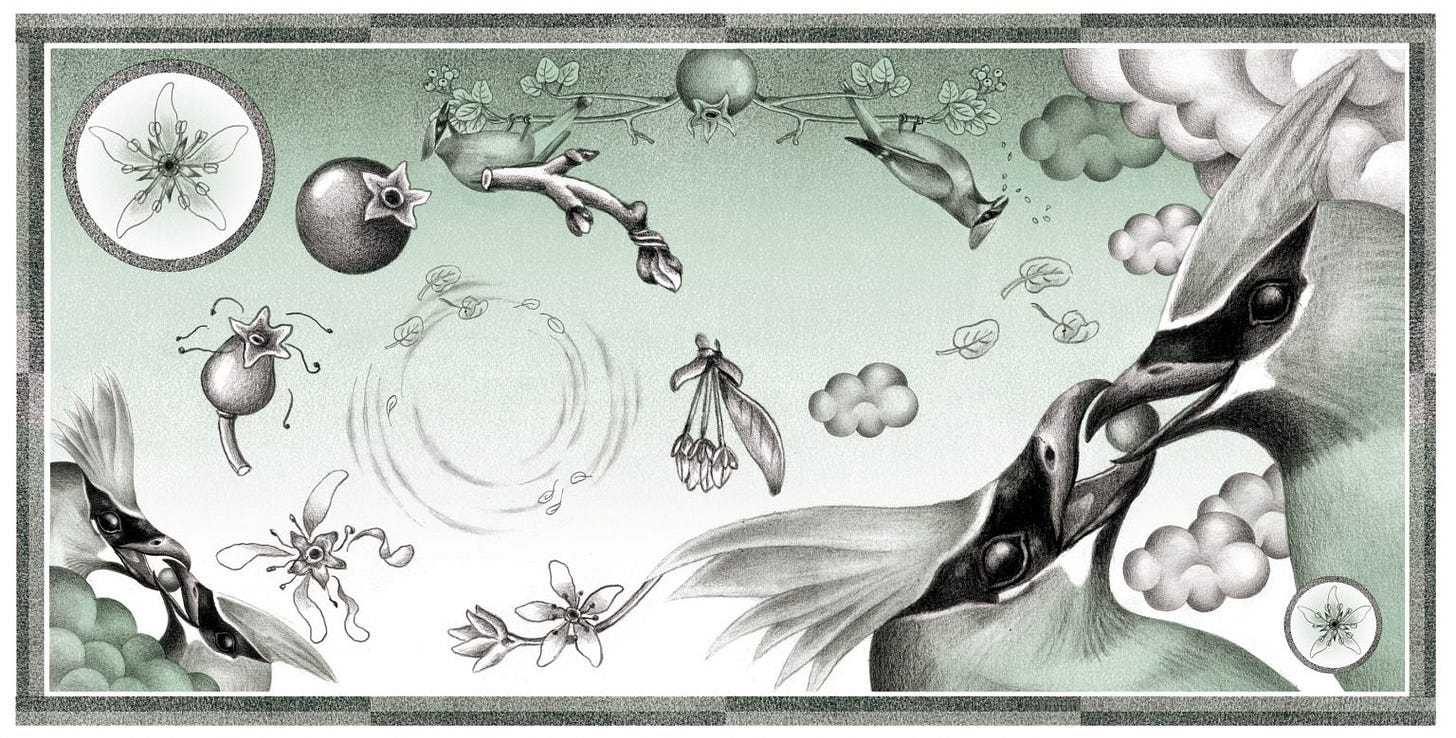The 20 Most Thoughtful Essays of 2020
Timeless, High-Signal Writing for the Ages
According to my ‘read-it-later’ app, I read over 1.8 million words in 2020, equivalent to more than 25 books worth of articles and essays. Reading is my weighted blanket, my cup of tea, my Sensimilla in pandemic times.
As the new year dawned, I went through the archives and found 20 of the most salient, high-signal, high-vibe, timeless pieces of writing about this Moment from the last calendar year.
Below, I’ve linked them all in the order of their publication. I’ve included: ✍️ a two-sentence synopsis or context of the piece, one direct quote, and ☂️ a rendering of the essay’s topic category.
Many of them reference some of the major events of the year. All of them stand the test of time 100% in my book. All are worth a full read, or re-read. Enjoy!
January 2020
“The Internet of Beefs” by Venkatesh Rao
✍️ No other essay I’ve found better underscores the nuances and dynamics of the culture wars playing out online. The nature of the game is that there are players who want to fight and beef, and the overlords who depend on their being a fight know how to make their minions fight ad infinitum.
Online public spaces are now being slowly taken over by beef-only thinkers, as the global culture wars evolve into a stable, endemic, background societal condition of continuous conflict. As the Great Weirding morphs into the Permaweird, the public internet is turning into the Internet of Beefs.
☂️ Topic: Culture Wars
✳️
“Alan Watts on liberation from political stalking” by Desmond Huxley
✍️ Leaning on the wisdom of Alan Watts to look at ways of liberating from “societal manipulation,” this piece touches a timeless nerve. If you look at the false binary of the political logjam of 2020, and the dynamics of online public spaces referenced above, a new paradigm can emerge to transcend above the left-right and see instead the whole game for what it is.
Obviously no society can tolerate within its own borders the existence of a way of liberation, a way of seeing through its institutions without feeling that such a way constitutes a threat to law and order. (Alan Watts)
☂️ Topic: (R)evolutionary Mysticism
March 2020
“Post-postmodern human: aware of everything, willing to change nothing” by Rob Wijnberg
✍️ One of the clearest assessments of our contemporary consumer culture, Wijnberg breakdowns the ubiquity of awareness, its impotence in the face of our always-on consumer minds, and the obscuring of our vision that our national boundaries brings. Wijnberg was the Founding Editor of The Correspondent, an exciting new publication that sadly shuttered as the new year started.
We peer out into the wide, wide world through our binoculars, a shopping bag dangling from our arm, our gaze shielded by the blinders of the nation state.
☂️ Topic: Consumerism in the Information Age
✳️
“The Great Unpatterning Continues. Make Sure You Take Advantage of It.” by Caitlin Johnstone
✍️ One of the most incisive and rebellious political thinkers of our time, Caitlin Johnstone gave us this outstanding frame about the moment for pivotal disruption. This was one of the first meta-takedowns at the outset of the pandemic.
Where there is pattern disruption, there is the opportunity for pattern divergence. Where there is movement, there are gaps. Where there are gaps, there is an opportunity for light to get through.
The clear-eyed rebel’s job, therefore, is to watch for opportunities to help lead us as a collective along a brand new, healthy trajectory.
☂️ Topic: Revolutionary Civic Engagement
✳️
“The Coronation” by Charles Eisenstein
✍️ One of my favorite philosophers of our time, Eisenstein put forth this deep, wide, thoughtful piece in early pandemic days. It highlights how our emergent response to the pandemic was both highly creative in its roughly united front (i.e., the world shut down in ways unimaginable) and limited for the ways that response more or less leaned on dominant “germ theory” paradigm without taking in more holistic, indigenous approaches.
Covid-19 is showing us that when humanity is united in common cause, phenomenally rapid change is possible. None of the world’s problems are technically difficult to solve; they originate in human disagreement. In coherency, humanity’s creative powers are boundless.
☂️ Topic: Pandemic
✳️
“No return to normal: for a post-pandemic liberation” by Max Haiven
✍️ If memory of March 2020 serves, there was a near-universal empathy, compassion, and cooperation that emerged (short-lived) as the gears of the economic system ground to a halt. In that moment, there was a thread of hopeful writing touting this global, mutual aid, highlighted by this essay.
We are learning again to become a cooperative species, shedding the claustrophobic skin of homo oeconomicus. In the suspension of a capitalist order of competition, distrust and endless, pointless hustle, our ingenuity and compassion are resurfacing like the dolphins returning to the Venice lagoon or birds to the smog-free sky.
☂️ Topic: Pandemic
April 2020
“68 Bits of Unsolicited Advice” by Kevin Kelly
✍️ The listicle to end all listicles in my opinion. An indelible list of wise advice in a year when we most needed it.
Optimize your generosity. No one on their deathbed has ever regretted giving too much away.
☂️ Topic: General Wisdom
✳️
“I, Coronavirus. Mother. Monster. Activist.” by Bayo Akomolafe
✍️ Few writers burn their way through new existential terrain with such vigor and wildness as Bayo Akomolafe, and this long-read about the virus and its context is no exception. If you’re wired for a journey, strap in and explore this one; it will leave its mark.
Something stranger than a pandemic is afoot, something queerer than the world being in some epic argument against viruses, something not easily named or processed or met by performances of social distancing. Something that wants more than a resolution.
☂️ Topic: Pandemic, and then some
✳️
“A Way Back” by Caleb Johnson
✍️ This is a sprawling, intimate profile of E.O. Wilson, one of our leading biologists and a seminal authority on biodiversity. 2020 was the year I moved to wild Colorado after 40 years in cities, and this piece helped bring me down to roots and soil in the most special, optimistic way.
“If we can hold to what we’ve been given, so to speak, by the rest of life in our own emergence as a species, then humanity can live forever. And Earth can be a paradise. There’s no reason we can’t think of ourselves as immortal as a species. And the planet, this biosphere, as immortal with us.”
☂️ Topic: Biodiversity
May 2020
“Fuck the Bread. The Bread Is Over.” by Sabrina Orah Mark
✍️ Perhaps no other piece of writing in 2020 more aptly, creatively, and ferociously evoked how our normal operations and systems under pandemic times were coming untethered. It’s a romp and a parable about parenting and finding new meaning in everyday work and tasks.
The new world order is rearranging itself on the planet and settling in. Our touchstone is changing color. Our criteria for earning a life, a living, are mutating like a virus that wants badly to stay alive.
☂️ Topic: Pandemic Meta
June 2020
“Permanent Assumptions” by Morgan Housel
✍️ In the dynamic untethering that was the first stage of the pandemic and its response, Housel distills through the mayhem nine “permanent assumptions.” These are earnest, mostly heart-warming truths to light our way through the uncertainty.
Some things are always changing and can’t be known. There can also be a handful of things you have unshakable faith in – your permanent assumptions.
☂️ Topic: General Wisdom
✳️
“What Is Owed” by Nikole-Hannah Jones
✍️ For anyone not yet convinced of the urgent need for the United States to reconcile and atone for the foundational horror and injustice of slavery, this piece is the rendering and framing that closes the argument. Its context setting for the 2020 racial justice protests is profound and heart-breaking, and its call for reparations is resonant and crystal clear.
If true justice and equality are ever to be achieved in the United States, the country must finally take seriously what it owes black Americans.
☂️ Topic: Racial Justice | Politics
✳️
“The Slow Road to Sudden Change: On the Decades of Activism That Leads to Historic Change” by Rebecca Solnit
✍️ This homage to the grassroots raises up the power of activism to forge change over time. During a summer rocked by grief, injustice, and the vestiges of oppression, the movement for racial justice erupted, and this piece documents with timely, poetic insight the long journey to meaningful change.
A great public change is the ratification of innumerable small private changes; the bonfire is a pile of these small changes lit by some unforeseen event.
☂️ Topic: Racial Justice
July 2020
“The garden of forking memes: how digital media distorts our sense of time” by Aaron Z. Lewis
✍️ In the canon of important musings on the impact of digital media on our individual and collective circumstances, this stands as one of the most salient. If we want to understand how our sense of time and history and narrative is displaced, spend some time with this one.
We’re transitioning from a world of linear narratives and time lines to a garden of forking memes that we’re free to explore and tend to. The gardening games with the richest soil, the deepest roots, and the most interesting characters will attract the most people.
☂️ Topic: Digital Media & Narrative
October 2020
“Early Work” by Paul Graham
✍️ Incisive and clear, Graham breaks down how we might adjust our lens on the early work that creators need to muscle through in order to get to the more valuable “great work” beyond. Strategies for surmounting this “early-work” hurdle include surrounding yourself with people with taste and tact enough to reflect the truth of one’s work back.
One of the biggest things holding people back from doing great work is the fear of making something lame. And this fear is not an irrational one. Many great projects go through a stage early on where they don't seem very impressive, even to their creators. You have to push through this stage to reach the great work that lies beyond.
☂️ Topic: Creativity & Productivity
✳️
“MJD 59,143” by Venkatesh Rao
✍️ What starts as Rao’s personal acknowledgment of a creative pivot in the content of his writing emerges into a rendering of the epochal change underway. It’s a call for writers, creators, and change agents to buckle up and help chart the course through this next decade in which the grand narratives of our time are shifting wholesale under our feet.
The 2020s [much like the 1920s] will be the Searing Twenties, a decadal pause between the Late/Post-modernist era and whatever comes next. It too will be a Lost decade.
☂️ Topic: Meta
✳️
“The Soaring Twenties” by Thomas J. Bevan
✍️ An excellent counterpoint to the Rao essay above, Bevan’s “Soaring Twenties” is the hopeful vision of an artful flourishing sure to come in what remains of this decade. Taking the 1920s Paris scene as its own internal cultural resonance, Bevan calls on the creators of our time to step up and write the redemptive rebound into existence.
The Soaring Twenties is not real. Not yet. But it can be, if you decide it will be. You just pick up your pen and write it down and make it so. The same as you do for any dream that you want to turn into a story.
☂️ Topic: Arts & Culture
✳️
“The hermeneutic circle: a key to critical reading” by Anne-Laure Le Cunff
✍️ Times are fraught and fast, as are the information flows, and I doubt many of us were taught the right way to process information in our reading. Navigating our own biases and pre-existing notions to get at meaning is a process — urgently necessary, if you ask me — here defined in Le Cunff’s habitual eloquent manner.
In order to practice critical reading, it is crucial to be aware of the context in which a text is read.
☂️ Topic: Mindful Productivity
November 2020
“What if Instead of Calling People Out, We Called Them In?” by Jessica Bennett
✍️ So-called “cancel culture” gets its own compassionate takedown, as Professor Loretta J. Ross helps clarify the many ways that calling people out undercuts the goal of inclusion and education. The solution proposed here is warm and elegant, a balm for our times and for the divisiveness within and without our ranks.
“We have a saying in the movement: Some people you can work with and some people you can work around. But the thing that I want to emphasize is that the calling-in practice means you always keep a seat at the table for them if they come back.”
☂️ Topic: Politics and Civic Engagement
December 2020
“The Serviceberry: An Economy of Abundance” by Robin Wall Kimmerer
✍️ Kimmerer’s book Braiding Sweetgrass is literally no joke in the top three books I’ve ever read. Her gift of seeing and sharing the magical reciprocity available in a right relationship with nature and community is profound poetry through and through, and this essay — a gift of its own at the end of the year.
I cherish the notion of the gift economy, that we might back away from the grinding market economy that reduces everything to a commodity and leaves most of us bereft of what we really want: relationship and purpose and beauty and meaning, which can never be commoditized.
☂️ Topic: Reciprocity, Biodiversity, Gift Economy
Thanks for reading. I had a short list of eight or nine honorable mentions that didn’t make this list. And I’m sure I missed a slew of excellent writing. I’d be curious to hear from you any other outstanding pieces I didn’t include here.
Onwards,
Griff







RE: The Internet of Beefs, I find Jonathan Haidt a useful thinker in this regard: https://samharris.org/subscriber-extras/137-safe-space/. his message here is his only message, but it is a truth that needs a landing pad...
re, The Internet of Beefs